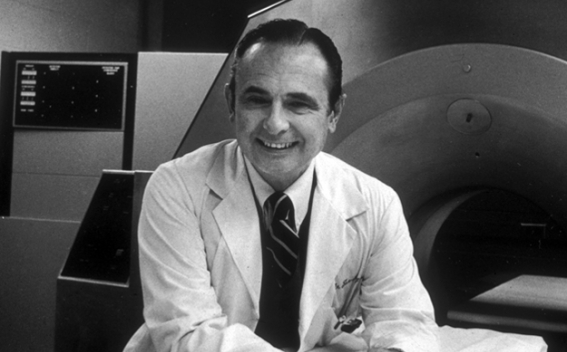Michel Matthew Ter-Pogossian, the ''Father'' of Positron Emission Tomography

The positron emission tomography scanner, invented in 1977 was a breakthrough in the history of medicine. Since then it became possible to assess the brain’s activity at different mental processes, to reveal cancer at its early stage and heart diseases. That was due to the efforts of renowned physicist and inventor of Armenian descent Michel Ter-Pogossian.
Michel Ter-Pogossian was born in Berlin, on April 21, 1925. He was the only child of a family that found refuge in Germany during the Armenian Genocide. Shortly after, the growing Nazi moods caused the family to move to France.
Michel’s passion for science, namely physics and chemistry came up in the early school years. In 1943 and 1946 he earned degrees in science respectively from the University of Paris and from the Institute of Radium. During World War II, he fought with the French Resistance Movement against the Nazi. Michel’s father concerned about his son’s future decided to immigrate to the US in 1946. There Michel entered Washington University of St. Louis, in large part by the reputation of Arthur Holly Compton, a physicist and a Nobel laureate, who was the university’s chancellor, beckerexhibits reports.
While studying for his degree, Ter-Pogossian worked in the Department of Physics as a research assistant. He received a master’s degree in 1948 and a doctoral degree in nuclear physics in 1950.
He joined the faculty of Mallinckrodt Institute in 1950 and was appointed as professor of radiation sciences in 1961. During the years of working there he recognized the potential of short-lived radioactive isotopes, and was one of the first to use them to find brain tumors and measure blood flow, The New York Times reports.
In 1961 Ter-Pogossian was appointed as professor of radiation sciences. In 1973 he was named head of Mallinckrodt Institute’s Division of Radiation Sciences.
Michel Ter-Pogossian is considered the “father” of positron emission tomography. In the 1970s he led a collaborative research team of physical scientists, chemists, and physicians who developed the concept of positron emission tomography (PET), a major contribution, PET displays actual metabolic activity within different regions of organs and tissues, thereby extending scientists’ and physicians’ understanding of basic biological processes and providing a basis for the improved diagnosis of diseases.
During a career that spanned more than four decades, he earned numerous accolades for his achievements in nuclear science, including France’s Gold Medal Award of the Société Francaise de Médecine Nucléaire et de Biophysique, Canada’s prestigious Gairdner Award, St. Louis’ Peter H. Raven Lifetime Award of the Academy of Sciences, as well as the Society of Nuclear Medicine’s Georg Charles de Hevesy Nuclear Medicine Pioneer Award and the Paul C. Aebersold Award.
Ter-Pogossian was a member of many professional societies, and served on the editorial boards of major scientific journals, including the American Journal of Roentgenology, the Journal of Nuclear Medicine, and the Journal de Biophysique & Médecine Nucléaire. was a charter member of the American Nuclear Society and a fellow of the American Physical Society.
In addition, he was a past trustee of the Academy of Sciences of St. Louis and served as an advisor for several Department of Energy and National Institutes of Health committees. Dr. Ter-Pogossian was a prolific author, with more than 250 papers and book chapters to his credit.
The scientist died in 1996, at the age of 71.
-
 17:08
17:08The regular session of the Anti-corruption Policy Council takes place in Jermuk
-
 15:05
15:05The Prime Minister sends congratulatory messages to the supreme leader of Iran and the President of Iran
-
 11:11
11:11Armenia sends earthquake aid to Turkey
-
 10:43
10:43Commemoration of the Pontiff St. Sahak Partev
-
 09:16
09:16Some roads are closed and difficult to pass in Armenia
-
 19:55
19:55Phone conversation of the Foreign Minister of Armenia with the U.S. Assistant Secretary of State for European and Eurasian Affairs
-
 18:30
18:30Prime Minister Pashinyan and President Khachaturyan meet
-
 18:20
18:20Ararat Mirzoyan with Co-Chairman of the OSCE Minsk Group of France Brice Roquefeuil
-
 17:01
17:01Humans could land on Mars within 10 years, Musk predicts
-
 16:45
16:45France, US urge 'immediate' end to Nagorno Karabakh blockade
-
 16:01
16:01Blockaded Nagorno Karabakh launches fundraiser to support quake-hit Syria
-
 15:59
15:59Earthquake death toll in Turkey rises to 18,342
-
 15:43
15:43Ararat Mirzoyan Held a Telephone Conversation with Sergey Lavrov
-
 15:06
15:06French president rules out fighter jet supplies to Ukraine in near future
-
 14:47
14:475 Day Weather Forecast in Armenia
-
 14:44
14:44President Vahagn Khachaturyan wrote a note in the book of condolences opened in the Embassy of Syria in Armenia
-
 14:20
14:20Azerbaijan’s provocations impede establishment of peace and stability – Armenian FM tells Russian Co-Chair of OSCE MG
-
 12:57
12:57France representation to OSCE: Paris calls on Azerbaijan to restore freedom of movement through Lachin corridor
-
 11:40
11:40Command of Kosovo forces highly appreciated preparation of Armenian peacekeepers
-
 10:16
10:16The United States withdrew from sanctions against Syria for six months the provision of assistance after the earthquake
day
week
month
Humidity: %
Wind: km/h









